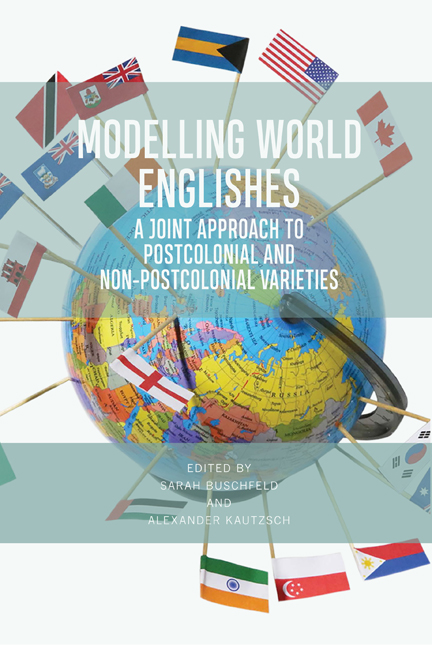Book contents
- Frontmatter
- Contents
- List of Figures and Tables
- List of Contributors
- Foreword
- 1 Introduction
- 2 English in England: The Parent Perspective
- 3 English in Namibia: Multilingualism and Ethnic Variation in the Extra- and Intra-territorial Forces Model
- 4 English in the United Arab Emirates: Status and Functions
- 5 English in India: Global Aspirations, Local Identities at the Grassroots
- 6 English in Singapore: Two Issues for the EIF Model
- 7 English in the Philippines: A Case of Rootedness and Routedness
- 8 English in South Korea: Applying the EIF Model
- 9 English in Japan: The Applicability of the EIF Model
- 10 English in Australia – Extra-territorial Influences
- 11 English in North America: Accounting for its Evolution
- 12 English in The Bahamas and Developmental Models of World Englishes: A Critical Analysis
- 13 Standard English in Trinidad: Multinormativity, Translocality, and Implications for the Dynamic Model and the EIF Model
- 14 Englishes in Tristan da Cunha, St Helena, Bermuda and the Falkland Islands: PCE, non-PCE or both? Blurred Boundaries in the Atlantic
- 15 English in Ireland: Intra-territorial Perspectives on Language Contact
- 16 English in Gibraltar: Applying the EIF Model to English in Non-Postcolonial Overseas Territories
- 17 English in Ghana: Extra- and Intra-territorial Forces in a Developmental Perspective
- 18 Synopsis: Fine-tuning the EIF Model
- Index
18 - Synopsis: Fine-tuning the EIF Model
Published online by Cambridge University Press: 24 September 2020
- Frontmatter
- Contents
- List of Figures and Tables
- List of Contributors
- Foreword
- 1 Introduction
- 2 English in England: The Parent Perspective
- 3 English in Namibia: Multilingualism and Ethnic Variation in the Extra- and Intra-territorial Forces Model
- 4 English in the United Arab Emirates: Status and Functions
- 5 English in India: Global Aspirations, Local Identities at the Grassroots
- 6 English in Singapore: Two Issues for the EIF Model
- 7 English in the Philippines: A Case of Rootedness and Routedness
- 8 English in South Korea: Applying the EIF Model
- 9 English in Japan: The Applicability of the EIF Model
- 10 English in Australia – Extra-territorial Influences
- 11 English in North America: Accounting for its Evolution
- 12 English in The Bahamas and Developmental Models of World Englishes: A Critical Analysis
- 13 Standard English in Trinidad: Multinormativity, Translocality, and Implications for the Dynamic Model and the EIF Model
- 14 Englishes in Tristan da Cunha, St Helena, Bermuda and the Falkland Islands: PCE, non-PCE or both? Blurred Boundaries in the Atlantic
- 15 English in Ireland: Intra-territorial Perspectives on Language Contact
- 16 English in Gibraltar: Applying the EIF Model to English in Non-Postcolonial Overseas Territories
- 17 English in Ghana: Extra- and Intra-territorial Forces in a Developmental Perspective
- 18 Synopsis: Fine-tuning the EIF Model
- Index
Summary
ASSESSING THE EIF MODEL: PERSPECTIVES FROM AROUND THE WORLD
The sixteen contributions to the present volume all make a significant contribution to World Englishes theorizing and shed important light on the strengths and weaknesses of the EIF Model. The contributions are very different in nature and set-up, coming from different directions and with slightly different objectives and foci. Some are mainly critical in nature, many others “simply” apply their case studies to the EIF Model and thus show that indeed it works; some glean rather anecdotal evidence, others present empirical data; some focus on a broader set of forces, others concentrate on a single particular force. I welcome this heterogeneous composition of the volume since it highlights the flexible character of the model and its valuable contribution to World Englishes theorizing, as well as some of its weaknesses.
Most of the articles seem to agree on (1) how “important it is to reduce the long-standing conceptual gap between postcolonial and non-postcolonial Englishes” (Schreier: 317); (2) that “[t]he EIF Model indeed allows for more internal differentiation by positing a range of extra- and intra-territorial factors […] and by explicitly incorporating variety-internal heterogeneity as a third dimension […]” (Labade et al.: 90); (3) that “[t]he EIF Model is a greatly welcomed extension of the Dynamic Model as it suggests and calls for a more fine-grained analysis of the factors contributing to the evolution of a variety of English” (Brato: 390); and (4) that “[t]he EIF Model […] can make an important contribution by providing new ways of looking at varieties, while at the same time accounting for the complex use of English in the evershifting speech communities of the twenty-first century” (D’Angelo and Ike: 179). Cristina Suárez-Gómez explicitly states that “it is the EIF Model which makes it possible to fully capture the situation of Gibraltar English, since it incorporates the influence of both external forces as well as internal forces to the configuration of the local reality” (366) and Schröder and Zähres point out that
Namibia (and NamE for that matter) may not be “a very prototypical case” (Buschfeld and Kautzsch 2017: 119) for a non-PCE, but may be an excellent test case for the EIF-Model, which does this country and its socio-historical linguistic situation far more justice than any other model of [World Englishes] to our knowledge.
- Type
- Chapter
- Information
- Modelling World EnglishesA Joint Approach to Postcolonial and Non-Postcolonial Varieties, pp. 397 - 415Publisher: Edinburgh University PressPrint publication year: 2020



